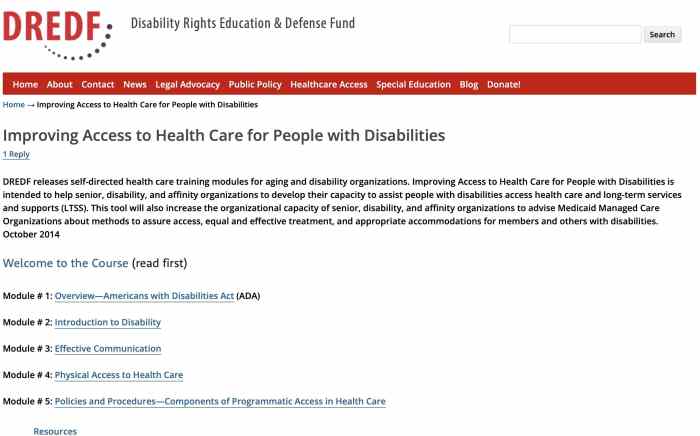
Access to Healthcare for Disabled People sets the stage for this enthralling narrative, offering readers a glimpse into a story that is rich in detail and brimming with originality from the outset. In a world where healthcare access is crucial, especially for disabled individuals, this topic delves into the challenges, costs, and strategies to enhance the quality of care.
Exploring the nuances of healthcare for disabled people sheds light on the disparities they face and the importance of tailored services to meet their unique needs. Let’s embark on a journey to understand how we can create a more inclusive and supportive healthcare system for all.
Healthcare Access for Disabled People
Individuals with disabilities often face numerous challenges when trying to access healthcare services. These barriers can prevent them from receiving the necessary medical care and support they require.
Examples of Barriers in Healthcare Access
- Lack of physical accessibility in healthcare facilities, such as ramps for wheelchair users or accessible restrooms.
- Communication barriers for individuals with hearing or speech impairments, leading to misunderstandings or inadequate information exchange.
- Financial constraints that make it difficult for disabled individuals to afford necessary treatments, medications, or assistive devices.
- Discrimination and stigma from healthcare providers, which can result in substandard care or reluctance to seek medical help.
Importance of Improving Accessibility
It is crucial to enhance accessibility in healthcare facilities to ensure that disabled individuals can receive equitable and quality medical care. By removing these barriers, healthcare providers can better meet the diverse needs of their patients and promote inclusivity in the healthcare system.
Healthcare Costs for Disabled People
Healthcare costs can have a significantly different impact on disabled individuals compared to the general population. The unique healthcare needs of people with disabilities often require specialized treatments, therapies, and assistive devices, all of which can contribute to higher medical expenses.
Financial Burden Faced by Disabled People
Disabled individuals often face a substantial financial burden when seeking medical treatment. In addition to the cost of healthcare services, they may also have to bear expenses related to accessibility accommodations, transportation to medical facilities, caregiver support, and ongoing therapies.
Strategies to Reduce Healthcare Costs for Individuals with Disabilities
- Explore health insurance options: Research and compare health insurance plans to find ones that offer coverage for essential treatments and services specific to your disability.
- Utilize government assistance programs: Look into programs like Medicaid, Medicare, or Social Security Disability Insurance (SSDI) to help offset healthcare costs.
- Seek out community resources: Many communities offer support services, financial assistance, or grants for individuals with disabilities to assist with medical expenses.
- Advocate for healthcare affordability: Get involved in advocacy efforts to push for policies that make healthcare more affordable and accessible for people with disabilities.
- Preventive care and self-management: Prioritize preventive care and self-management strategies to reduce the need for costly medical interventions in the long run.
Healthcare Providers for Disabled People

When it comes to healthcare for disabled individuals, it is crucial to have specialized healthcare providers who understand their unique needs and challenges. These providers play a vital role in ensuring that disabled patients receive the quality care they deserve.
Training healthcare professionals to better serve disabled patients is essential to improving the overall healthcare experience for this population. By increasing awareness, empathy, and knowledge of specific disabilities, healthcare providers can offer more effective and personalized care to their disabled patients.
Specialized Healthcare Providers
- Rehabilitation Centers: These facilities focus on helping disabled individuals regain independence through therapy and support services.
- Specialized Clinics: Clinics that cater specifically to certain disabilities, such as autism or cerebral palsy, provide tailored care and expertise.
- Home Healthcare Agencies: These agencies offer in-home care services for disabled patients who may have difficulty accessing traditional healthcare settings.
Importance of Training Healthcare Professionals
- Improved Communication: Proper training can help healthcare professionals communicate effectively with disabled patients and understand their unique needs.
- Enhanced Care Quality: Training ensures that healthcare providers can deliver high-quality, patient-centered care to disabled individuals.
- Promoting Inclusivity: By training healthcare professionals, we can create a more inclusive healthcare system that caters to the needs of all patients.
Success Stories in Healthcare Providers
- A specialized clinic for children with autism implemented sensory-friendly waiting areas and trained staff to better accommodate the needs of their patients, resulting in improved patient outcomes and satisfaction.
- A home healthcare agency developed a specialized program for disabled seniors, focusing on independence and quality of life, leading to increased overall well-being and reduced hospital readmissions.
- A rehabilitation center introduced innovative therapy techniques for spinal cord injury patients, significantly improving their mobility and overall quality of life.
Health Insurance and Disabled People
Individuals with disabilities often face challenges when it comes to obtaining and maintaining health insurance coverage. This can result in limited access to necessary medical services and treatments, creating barriers to overall health and well-being.
Health Insurance Options for Disabled Individuals
There are several health insurance options available for disabled individuals, each with its own set of benefits and limitations. Some common options include:
- Medicaid: A state and federally funded program that provides health coverage for eligible low-income individuals, including those with disabilities.
- Medicare: A federal health insurance program for individuals aged 65 and older, as well as younger individuals with certain disabilities.
- Employer-sponsored insurance: Some disabled individuals may have access to health insurance through their employer, either through group plans or individual coverage.
- Health insurance marketplaces: These online platforms allow individuals to compare and purchase health insurance plans, often with subsidies available based on income.
Tips for Navigating Health Insurance Complexities
For disabled individuals seeking adequate health insurance coverage, navigating the complexities of the system can be overwhelming. Here are some tips to help navigate the process:
- Educate yourself on available options: Research different health insurance programs and plans to determine which best fits your needs and eligibility requirements.
- Seek assistance: Reach out to healthcare advocates, social workers, or disability organizations for guidance and support in understanding and applying for health insurance.
- Understand your rights: Familiarize yourself with laws such as the Affordable Care Act, which prohibits discrimination based on disability and ensures access to essential health benefits.
- Maintain documentation: Keep thorough records of medical expenses, insurance correspondence, and healthcare services to ensure accurate billing and coverage.
- Review your coverage regularly: Stay informed about changes to your health insurance plan, including benefits, premiums, and network providers, to ensure continued access to necessary care.
Health Policies Impacting Disabled People
Government policies play a crucial role in shaping the access to healthcare for disabled individuals. These policies can either facilitate or hinder the ability of people with disabilities to receive the care they need. In this section, we will analyze existing health policies, discuss their impact on healthcare equity for disabled populations, and propose recommendations for policymakers to improve healthcare access and quality for this vulnerable group.
Accessibility Requirements in Healthcare Facilities
One important aspect of health policies impacting disabled people is the requirement for healthcare facilities to be accessible to individuals with disabilities. This includes physical accessibility, such as ramps and elevators for wheelchair users, as well as accommodations for individuals with sensory impairments. Compliance with these accessibility requirements ensures that disabled individuals can receive healthcare services without barriers.
Health Insurance Coverage for Assistive Devices
Another critical policy area is health insurance coverage for assistive devices and equipment that are essential for the daily functioning of many disabled individuals. Policies that mandate insurance coverage for assistive devices such as wheelchairs, hearing aids, and communication devices can significantly improve the quality of life for people with disabilities by enabling them to participate fully in society.
Training and Education for Healthcare Providers
Health policies should also focus on training and educating healthcare providers on how to effectively communicate with and treat patients with disabilities. By promoting sensitivity and awareness among healthcare professionals, policies can help ensure that disabled individuals receive the respectful and competent care they deserve.
Health Records Management for Disabled People
Accurate health records play a crucial role in managing the healthcare needs of individuals with disabilities. These records provide vital information about the individual’s medical history, current conditions, medications, treatments, and any specific requirements or accommodations needed.
Importance of Accurate Health Records
- Facilitate continuity of care by ensuring healthcare providers have up-to-date information on the individual’s health status and needs.
- Help in timely diagnosis and treatment of medical conditions, including identifying potential complications related to the disability.
- Enable coordination among different healthcare providers and specialists involved in the individual’s care.
- Support decision-making processes regarding treatment options, medication management, and follow-up care.
Challenges Faced by Disabled Individuals
- Accessibility barriers in obtaining physical copies of health records from healthcare facilities or providers.
- Difficulty in understanding complex medical terminology or navigating electronic health record systems.
- Privacy concerns related to sharing sensitive health information with multiple healthcare providers or agencies.
- Lack of awareness about the importance of maintaining and updating health records regularly.
Advancements in Technology for Better Health Record Management
- Electronic health records (EHRs) and patient portals offer online access to medical information, appointments, lab results, and medication lists.
- Mobile health applications allow individuals to track their health data, set medication reminders, and communicate with healthcare providers remotely.
- Integration of assistive technologies, such as voice recognition software or screen readers, to improve accessibility for individuals with visual or cognitive impairments.
- Data sharing platforms that enable secure exchange of health information among healthcare providers, ensuring continuity of care for disabled patients.
Health Screening and Prevention for Disabled People

Regular health screenings are crucial for individuals with disabilities to detect potential health issues early on and prevent complications. These screenings can help in managing existing conditions effectively and improving overall health outcomes.
Barriers to Timely Preventive Healthcare Services
- Transportation challenges: Many disabled individuals face difficulties in accessing healthcare facilities due to transportation barriers.
- Lack of accessibility: Healthcare facilities may not always be equipped to accommodate the needs of disabled patients, leading to missed opportunities for preventive care.
- Communication barriers: Limited communication options can hinder disabled individuals from understanding the importance of preventive screenings or following up on appointments.
Successful Health Screening Programs for Disabled Populations
- Mobile screening units: Bringing healthcare services directly to communities where disabled individuals reside can overcome transportation challenges.
- Accessible facilities: Healthcare providers offering accessible facilities with accommodations for different disabilities can encourage regular screenings.
- Tailored communication: Providing information in various formats such as braille, sign language, or easy-to-read materials can improve understanding and compliance with preventive care recommendations.
As we conclude this discussion on Access to Healthcare for Disabled People, it becomes evident that ensuring equitable access to quality healthcare is essential for all individuals, regardless of ability. By addressing the barriers, advocating for policy changes, and fostering a more inclusive healthcare environment, we can strive towards a future where healthcare is truly accessible to everyone.
FAQ Overview
How can healthcare facilities improve accessibility for disabled individuals?
Healthcare facilities can enhance accessibility by providing ramps, wider doorways, accessible parking spaces, and trained staff to assist disabled patients.
What are some challenges disabled individuals face in obtaining health insurance?
Disabled individuals often encounter difficulties in obtaining affordable health insurance, dealing with coverage denials, and understanding complex insurance policies due to their unique healthcare needs.
Why is it important for healthcare providers to receive training in serving disabled patients?
Training healthcare providers ensures they understand the specific needs and challenges faced by disabled patients, leading to improved care quality and patient satisfaction.






